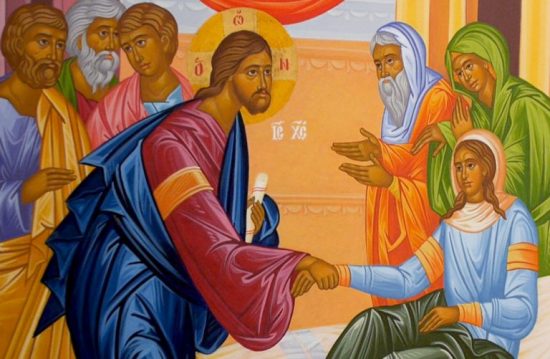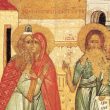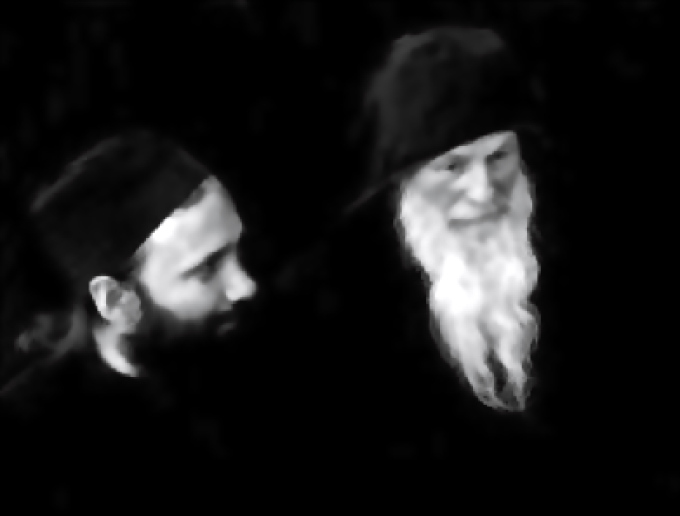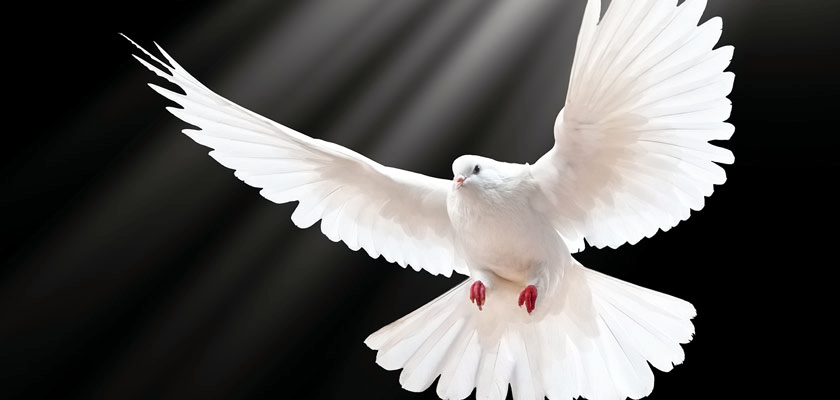Jesus raises from death Jairus` daughter
22 Then one of the synagogue leaders, named Jairus, came, and when he saw Jesus, he fell at his feet. 23 He pleaded earnestly with him, “My little daughter is dying. Please come and put your hands on her so that she will be healed and live.” 24 So Jesus went with him.
35 While Jesus was still speaking, some people came from the house of Jairus, the synagogue leader. “Your daughter is dead,” they said. “Why bother the teacher anymore?”
36 Overhearing[c] what they said, Jesus told him, “Don’t be afraid; just believe.”
37 He did not let anyone follow him except Peter, James and John the brother of James. 38 When they came to the home of the synagogue leader, Jesus saw a commotion, with people crying and wailing loudly. 39 He went in and said to them, “Why all this commotion and wailing? The child is not dead but asleep.” 40 But they laughed at him.
After he put them all out, he took the child’s father and mother and the disciples who were with him, and went in where the child was. 41 He took her by the hand and said to her, “Talitha koum!” (which means “Little girl, I say to you, get up!”). 42 Immediately the girl stood up and began to walk around (she was twelve years old). At this they were completely astonished. 43 He gave strict orders not to let anyone know about this, and told them to give her something to eat.
Jesus left there and went to his hometown, accompanied by his disciples. 2
Why do we commemorate the reposed?
The life of Saint Makarios the Egyptian – Word of Saint Makarios the Egyptian about the departure of the soul of righteous and of sinful people, in Church Fathers and Writers (1992), vol. 34, pp. 67-70
And abba Makarios said again : My lords (Saint Makarios speaks to the two angels who followed him one day while he was journeying through the desert) please explain to me these things: Why do we follow the habit inherited from the Fathers to bring oblation for the dead on the third day, on the nineth and the fortieth and what is its use for the soul who left the body? The angel answered to him: Nothing is without meaning; nothing was allowed by God to be made at random in His Church. He is the One who not only allowed but ordered to be served in His Church the heavenly and earthly mysteries (for the departure of the soul from the body). Serving the Holy Liturgy in the Church on these days the soul of the reposed receives comfort from the Angel who took him; as the blessing and oblation are brought for him in the Church of God. This thing is hope giving. In the two days after death the soul is allowed being followed by Angels to go wherever he wants on earth. The soul which was fond of the body goes either to the house from where he left or to the tomb where the body was buried. The virtuous soul goes to the places where he used to do justice. On the third day any Christian soul ascends to heaven for worshiping the God of all and for imitating the Resurrection from the dead – on the third day – of Christ, the God of all. Therefore the Church does a good thing bringing oblation on the third day and making prayers for the soul.
Source: http://ziarullumina.ro






